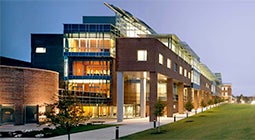We have a strong history of making scientific and engineering education available to anyone with extraordinary talent and determination. Rensselaer admitted its first women students and lecturers in 1828 (four years after the Institute’s founding) and produced its first Hispanic and African-American graduates in 1850 and 1881, respectively.
In the 21st century, Rensselaer strives towards creating a welcoming community for students and researchers at all levels of the Institute, and in particular at the Ph.D. level in the science and engineering disciplines. These strategies make a sustainable and meaningful impact.
The Training Program is no exception to this and as such strives to attract students to basic and applied sciences, engineering and architecture who traditionally would not have considered this an option. We will eagerly facilitate their successful graduation into industry, academic positions, and postdoctoral work.
Rensselaer actively reaches out to potential students who traditionally would not have considered pursuing such programs. The Training Program in Alzheimer's disease will be enhanced by interaction with several ongoing recruitment and retention efforts already in place at Rensselaer.
We understand the importance a proactive and personable approach to attracting individuals from underrepresented groups. Early counseling and funded visits are provided to qualified candidates during annual recruiting initiatives coordinated through The Division of Enrollment.
We will continue to actively recruit potential Trainees in a “need-blind” manner. The recruitment of both disadvantaged and disabled applicants will be simultaneous with the recruitment of underrepresented and non-underrepresented students.
We have established positive working partnerships with leading historically black colleges and universities (HBCUs) and Hispanic Serving Institutions (HSIs), and engage in a specialized visitation program.
Rensselaer is an active participant in national and regional events targeting underrepresented students interested in graduate studies.
A critical aspect of mentoring is to guarantee successful career performance. This depends on a host of professional skills that are seldom explicitly taught in graduate school, such as succeeding in academia, planning a career, using electronic sources, and writing research proposals.
